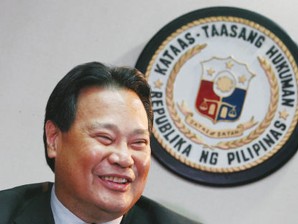Impeached Chief Justice Renato Corona and the rest of the 15-member Supreme Court have filed on time their statements of assets, liabilities and net worth (SALNs), but the court is withholding their public disclosure in line with a 23-year-old resolution.
Jose Midas Marquez, court spokesperson and concurrent administrator, on Wednesday said the magistrates submitted their SALNs to the Office of the Clerk of Court as mandated by the Constitution. He said the submissions were made within the April 30 filing deadline.
Marquez declined to provide any details of the justices’ financial records in line with the tribunal’s 1989 ruling prohibiting the release of their SALNs.
One of the accusations against Corona in his impeachment trial was his failure to disclose his net worth.
Marquez told reporters that the high court had yet to act on a pending request for the release of the SALNs which was filed by the Philippine Center for Investigative Journalism (PCIJ).
“There is an existing court resolution that prevents public disclosure of SALNs. Until and unless that resolution is reconsidered by the court, it stays (effective),” Marquez said.
Individual request
However, Marquez said groups and individuals may directly request a justice for a copy of his SALN.
“If individual justices opt to release their respective SALNs, that’s their own decision,”
Marquez said. “They can just explain [before the court] why they agreed to release their SALN.”
Marquez added: “The court issued a resolution on this issue in 1989. That ruling is still the policy of the court to prevent the SALN from being used for other purposes.”
In its May 2, 1989, resolution, the high tribunal unanimously voted to deny the request for SALN “directly or indirectly traced to a litigant, lawyer or interested party in a case pending before the court.” The court issued the resolution after a petition filed by one Jose Alejandrino.
“The independence of the judiciary is constitutionally as important as the right to information which is subject to the limitations provided by law,” the tribunal said then.
It said the court must deny requests for the release of SALN which were “not made in good faith and for a legitimate purpose, but to fish for information and … to influence a decision or to warn the court of the unpleasant consequences of an adverse judgment.”
In 1992, the high court upheld its 1989 ruling and restricted the release of the SALNs of justices and judges to shield them from acts which may “endanger, diminish or destroy their independence and objectivity in the performance of their judicial functions.”
House members, too
Nearly five months after impeaching Corona for, among others, failing to disclose his net worth, members of the House of Representatives continue to impose rigid requirements to keep the records of their personal fortunes hush-hush from the public.
Executives from the House Secretary General office have rejected requests for copies of the full version of the SALNs of the lawmakers despite declarations from members of the House panel prosecuting Corona that they would release their SALNs without any hassle.
Bobby Maling, a House director, said the SALNs were still subject to review by the House’s legal advisers. Maling, however, could not explain the purpose of the review.
Disclosure of net worth is mandatory for all government employees, including lawmakers.
Less burdensome
Maling said that under standard operating procedure (SOP), requests for copies of the SALNs should be made in writing, the person making the request should agree to be interviewed by the secretariat, the request would undergo further evaluation by the secretary general and the legislative affairs department, and the request would be forwarded to the House member for final approval.
Maling said the process would take at least 10 days. When told that the senators voluntarily released copies of their SALNs, Maling said the House and the Senate operated under their own rules.
Artemio Adasa, the deputy secretary general, said his office was drafting a new set of SOP that would make the process less burdensome both for the person making the request and the concerned representative.
No reply
But Adasa said the House would continue to require an interview of the person requesting for the SALN out of concern that the SALN might be used for criminal purposes, such as kidnapping.
Adasa said all 286 House members had submitted their SALNs, including fugitive Dinagat Island Representative Ruben Ecleo Jr., a convicted wife killer.
Iloilo Representative Niel Tupas Jr. and other members of the House prosecution team did not reply to the Inquirer’s query on the public disclosure of their SALNs, which they demanded of Corona in December when 188 members approved and transmitted the articles of impeachment against the Chief Justice. With Tetch Torres, INQUIRER.net
Originally posted at 10:31 pm | Wednesday, May 02, 2012
